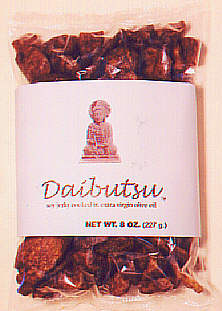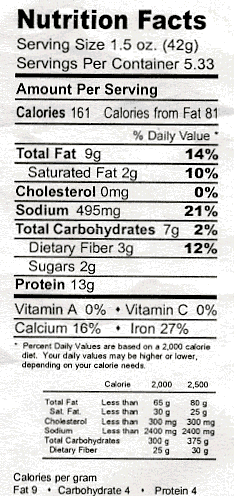 e are frequently asked about what
diets are the most "health supporting,"
what foods "should we avoid," what snacks
can "we include," etc. (Such volume of queries is the reason
we created a free section, covering book reviews
on the relationship between lifestyle and degenerative disease.)

 Based on our own research
on changes in dietary habits in the West over the last 100 years,
we have come to the conclusion that one of the leading
contributors to the upsurge in cancer, heart disease,
diabetes, and other degenerative disease is diet ...
and few areas present so deplorable a picture of
disease-inducement as the current state of
between-meal snacks.
 Today's processed
foods, and most particularly snacks, tend to
be high in fat -- unhealthy saturated fats, not
essential fatty acids; high in their sodium to potassium ratio;
many contain potentially harmful additives, such as
nitrates; and many are not well preserved with
natural ingredients -- giving rise to undetectably
high levels of microbial growth, and fat oxidation.
 The majority of those
snacks which do prance on the retail shelf with
declarations of "All Natural" or "Organic," are not
healthy, either ---- better than 90% of them
use either a high level of saturated fats, or --
going in the other direction, unprotected fats
for which there is no protection against rancidity
and the development of free radicals. Moreover
(on a more controversial note), most
contain high levels of a cancer-causing
derivative called "acrylamide," according
Sweden's National Food Administration (see side
panel at right).
This would includes almost all potato, corn and tortilla chips;
pretzels; corn puffs; pork rinds; french fries ---
not to mention breads, donuts, and a smorgasborg of
other baked items, etc.
 These snacks
comprise a huge percentage of what constitutes the
oft-mentioned "Western diet." If the work
conducted in Sweden is confirmed elsewhere and
the cancer-causing threshold for consumption
of acrylamide by humans is confirmed as being
in line with current usage, acrylamides may
eventually become a labelled item for food
products.
A Truly 'Healthy' Snack
 We believe that
Daibutsu is one of the most delicious,
healthy between-meal snacks you'll ever try.
We are proud to add it to the Alpha Omega Labs
family of products . . .

Eat Right Out of the Bag ... Or
Microwave For 10 Seconds
For a Hot, Sizzlin' Snack
 Unlike 'real jerky,'
Daibutsu can be eaten right out of the bag --
or microwaved for 10 seconds for a hot, meaty snack ...
try a bag today!
|
Soy Protein:
A Mountain of Evidence
On The Positive Benefits
 Despite the
scare tactics
by competing interests, trying to bad mouth soy,
the evidence of health benefits is nothing short
of voluminous.
 One group of compounds,
isoflavones,
is unique to soy and its
many benefits,
including inhibition of breast cancer and forestalling of post-menopausal
complications, are
quite
well-documented.
 Daibutsu Daibutsu has been lab-tested
and found to contain not less then the following contents of the
four isoflavones:

Genistein --- 220 mgm/g

Daidzein --- 140 mgm/g

Genistin --- 60 mgm/g

Daidzin --- 17 mgm/g
 In April, 2002,
officials from the National Food Administration (a Swedish
government agency), working in conjunction with Stockholm
University, announced that certain snacks and baked
goods, including French fries, bread, biscuits -
even chocolate -
contained
extraordinarily high levels of acrylamide
- a compound which even
the politically active U.S. Environmental Protection Agency
lists
as a medium hazard 'probable human carcinogen.'
( See
Mallinckrodt Baker's warning statement for acrylamide, which
it manufactures). Other European research scientists, including a
British group
confirmed the findings, which lead to a series of ad hoc
meetings among world-noted
cancer
experts.
" . . . the genotoxic studies have indicated
that there is no threshold value for the risk of cancer
induced by acrylamide, i.e. there is no dose of acrylamide
so low that it does not increase the risk of cancer . . .
it may now be possible to explain some of the cases
of cancer caused by food."
 The research was
subsequently published in the
Journal
of Agriculture and Food Chemistry (August 14, 2002), along
with the mass media - which produced its own smorgasborg of
insights which ran throughout the summer.
The finding that the
consumption of a single potato chip would bring
acrylamide intake up to the WHO (World Health Organization)
maximum for drinking water, led that organization to
announce an emergency meeting -- which lead
the U.N. agency to announce that "... acrylamide in
food poses a significant, but
yet
undetermined, amount of risk to consumers ..." and
the U.S. Food & Drug Administration to announce that
the evidence is insufficient to warrant any changes
in current dietary recommendations (a position shared
by others in the
academic community -- though it should be noted this
is the same position that orthodoxy held on cigarette smoking
as a lifestyle choice up until the 1960's).
 Although we would
agree
there is
much more research to be done --- (one
source was critical for the extraction of rodent
toxicology data to humans, which, if correct,
would mean that the average human would have
to consume 165 lbs. of potato chips per day
to
get
even one-tenth of the lowest observed toxic dose) ---
there is something everyone can easily do NOW.
Most cancer is, after all, a condition created by
the buildup of cellular "insults" from
multiple sources over a period of time.
Very rarely is a cancer induced because of one
source over a relatively short time span.
 It is with
this in mind that Alpha Omega Labs' had Daibutsu
tested and obtained the following analysis ---
(please keep in mind that 10 parts per billion
is the minimum threshold at which acrylamide
can even be detected):
--- Daibutsu - "Beef Burgundy" (11 ppb)
--- Daibutsu - "Spicy Beef" (11 ppb)
--- Daibutsu - "BBQ Beef" (22 ppb)
--- Daibutsu - "Teriyaki" (undetectable)
--- Daibutsu - "Sweet Ham" (undetectable)
--- Daibutsu - "Pepperoni" (12 ppb)
 Compared to other
snack foods, which can range from 300 to 1,000 ppb or
more -- these figures indicate that Daibutsu
contains a level of acrylamide from cooking that
is 'little to none.'
|



